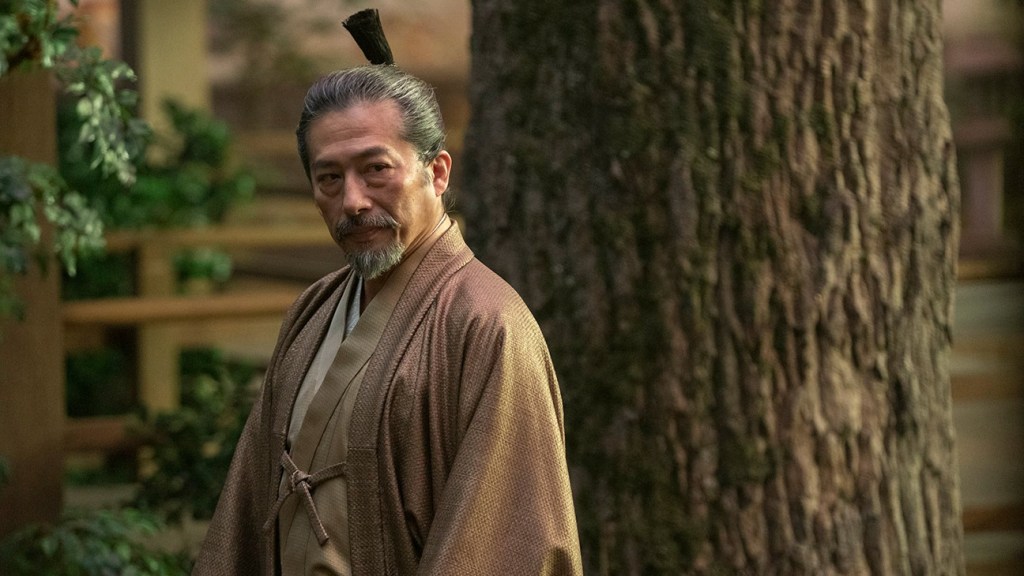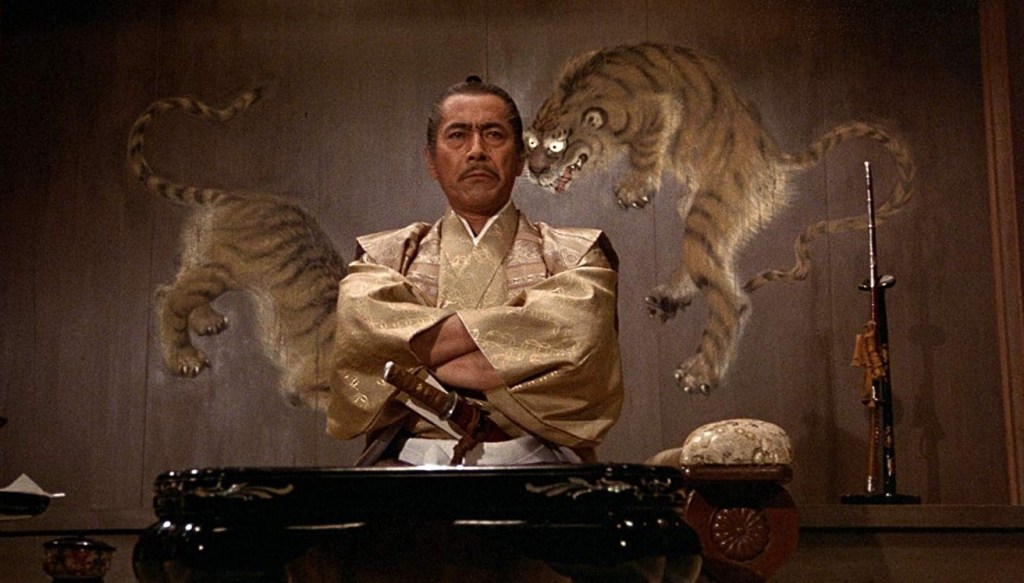I recently finished watching the new Shogun mini-series, and yes, I have thoughts. Before I inflict those thoughts on you, I should report that I’ve read the novel twice. I don’t recall when I first read it, but it was many years ago; I reread it earlier this year when I heard about the remake of the mini-series. I should also say I’ve seen the original Shogun mini-series starring Richard Chamberlain and Toshiro Mifune. So I can compare the new version to the old version and to the novel itself.
Shogun 2024 is both better and worse than Shogun 1980. Visually, it’s significantly better. The cinematography is spectacular. It’s certainly darker (literally), but the biggest difference is the story world of Shogun 2024 looks and feels lived in, if that makes sense. The story world in Shogun 1980 looked and felt like elaborate movie sets. The production values of Shogun 1980 are a product of their time, and it shows. There’s a convincing verisimilitude in the new version that was absent in the original.
The narrative in the new version is, in some ways, easier to follow–which ought to be a good thing, but isn’t always. I’d heard it would emphasize the Japanese perspective over that of the European protagonist. I confess, I was of two minds about this. I mean, the story takes place in early 17th Japan, so yeah, obviously it should be sensitive to the existing culture. But at the same time, it’s a classic ‘stranger in a strange land’ tale. At its heart, it’s a story about a person trying to understand and survive a society that’s exceedingly different from his own.

In Shogun 2024, the Japanese dialog includes subtitles. This, obviously, allows the viewer to understand what’s being said. Shogun 1980 did NOT provide subtitles, which had a HUGE impact on the story and the viewing experience. The viewer was as confused and uncertain about what was happening as Blackthorne. Unless you spoke Japanese, you were at the mercy of Mariko’s translation–or you were forced to try to deduce what was being said based on the behavior of the characters. This reinforced Blackthorne’s sense of isolation. The absence of subtitles also required the actors to rely more on face and body acting; they had to use body language and facial reactions to physically demonstrate what was taking place and being said.
This leads me to my main criticism of Shogun 2024, which is the way Toranaga is depicted. In the novel and in Shogun 1980, Toranaga clearly enjoys being alive. He displays a wide range of emotions; he’s exuberant, he’s stern, he drinks, he’s sentimental, he laughs, he gets angry, he’s wise, he’s deeply curious, he’s willing to be silly, he’s deadly serious, he’s stubborn. For example, in Shogun 1980 Toranaga sees Blackthorne dive off the ship, headfirst into the water. It’s a technique new to Japan and Toranaga immediately wants to learn to dive (this, by the way, is at the heart of the Toranaga-Anjin relationship; Blackthorne has skills that surprise and intrigue Toranaga, skills he wants to learn). Blackthorne demonstrates the dive. Toranaga and his retainers all try it. However, Toranaga is unable to make a proper dive. Initially, it’s a funny scene; his repeated painful belly flops are comical. But Toranaga’s failure at diving puts him at risk of losing face in front of his followers. Blackthorne eventually demonstrates a simpler method and Toranaga finally succeeds. We learn a lot about Toranaga in that scene — his thrill at learning something new, his joy of playing around in the water, his stubbornness and determination, his pride.
In Shogun 2024, however, Toranaga says he wants to learn to dive, but only watches as Blackthorne repeatedly demonstrates his diving technique. Eventually Toranaga leaps into the water and challenges Blackthorne to a race. We learn almost nothing interesting about Toranaga in the 2024 version.

Another example, in Shogun 1980 Blackthorne is being entertained by some women and he becomes a wee bit drunk and high-spirited. He sings a shanty and dances a hornpipe. The noise draws Toranaga to the room. Blackthorne realizes he’s created a scene (which is frowned upon in Japanese society) and starts to apologize, but Toranaga is intrigued and insists on seeing the dance. He then decides to learn Blackthorne’s dance. We’re treated to a scene in which Toranaga is attempting to dance a hornpipe. It’s wonderfully ridiculous and delightful.
The Toranaga of Shogun 2024 doesn’t dance. He doesn’t laugh, he doesn’t get sentimental, he doesn’t get tipsy, he doesn’t get silly, he doesn’t seem to enjoy much of anything. Throughout the series, he’s almost always stern and serious.
In my opinion, this handicaps Toranaga’s development as a character. This is especially clear after Toranaga’s capitulation to his brother and his announced decision to surrender himself in Osaka. In Shogun 1980 and the novel, we see Toranaga lose his joy; we see him defeated and deflated and depressed; there’s a marked contradiction in his behavior. He’s emotionally diminished. The Toranaga of Shogun 2024, on the other hand, has been consistently sober and serious. When he submits to his brother and Osaka, the change in his demeanor is slight. Instead of showing him emotionally changed, the narrative suggests he’s physically ill as well as depressed. It’s simply not as interesting.
This flaw (and yeah, to me it’s a massive flaw) becomes more obvious at the end of the series. Toranaga makes a series of confessions, including the fact that he’s always wanted to become Shogun. In Shogun 1980, he also admits he had Blackthorne’s ship destroyed to keep him in Japan, largely because he needs Blackthorne — not because of his ship or his skills, but because his alien/outsider status allows Toranaga to have an actual friend, somebody who doesn’t have a Japanese agenda. In both versions of the show, Toranaga declares Blackthorne “makes me laugh.” In Shogun 1980, we see that laughter and we know it’s true. Toranaga makes the same statement in Shogun 2024, but we never see that joyful/playful side, so the comment doesn’t ring true.
Shogun 2024 centers the experience of the Japanese characters, but that makes it a story about political maneuvering. Shogun 2024 is about Toranaga’s hidden agenda to become Shogun, in which Blackthorne plays a minor role. In this version, Blackthorne is actively resistant — hostile, even — to change. He remains boorish, rude, and almost willfully ignorant of Japan’s societal norms. It’s not until the final episode, when he realizes he’s unlikely to be able to return to Europe, that he seems to genuinely adapt to Japanese life. It’s a story about political conflict.
Shogun 1980 (and the novel), on the other hand, is about Blackthorne’s struggle to adapt to a very alien culture, which takes place during a potential civil war in Japan. In this version, Blackthorne realizes there are many positive aspects of this new culture and he eagerly embraces aspects of it. This is maybe most clear in Blackthorne’s enthusiastic “Oh lawdy, I fucking LOVE a hot bath” revelation and his pleasure at the simple cleanliness of Japan. It’s a story about cultural conflict.
Both versions end with Blackthorne realizing he’ll never get to leave Japan. But that awareness lands differently in each version. In Shogun 1980, Blackthorne’s willingness to adapt makes his acceptance less painful; having to live the rest of his life in Japan doesn’t seem like much of a sacrifice. In Shogun 2024, however, Blackthorne having to stay in Japan feels like a prison sentence which he’ll try to make it as palatable as possible.
I found Shogun 2024 to be a more compelling and visually interesting story. But I also think it’s a less enjoyable story.

I remember reading the novel when I was a teen & loving it. I didn’t like the 1980 mini-series; Richard Chamberlain was SO not Blackthorne. I haven’t seen the new production. I plan on rereading the book very soon.
LikeLiked by 1 person
When you say “Richard Chamberlain was SO not Blackthorne” are saying his appearance didn’t match your expectation, or you disliked his portrayal of the character, or something else?
I’d say Cosmo Jarvis LOOKED more like a ship’s pilot (as if I have a clue what a 17th century ship’s pilot should look like) than Chamberlain did, but I found Chamberlain’s depiction of the character more closely resembled the character in the novel. That said, I loved Jarvis’ voice acting.
LikeLike
As I remember, the description of Blackthorne in the book didn’t match Richard Chamberlain at all. But I was very young & I probably would have a different attitude now. Age brings different views to things.
I just requested the novel to be sent to my local library from the main library. I look forward to reading it again.
LikeLike